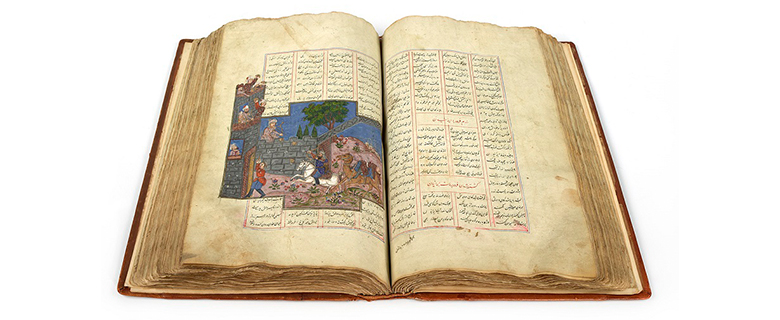
The heritage of the Middle East and its preservation is one of the reasons that Qatar National Library exists.
The protection and elevation of the region’s history and knowledge is fundamental to our daily work, and we take great pride in the many artefacts, images and historical documents that the Heritage Library is custodian of, some going back a thousand years and many iconic to the region. Among these is the epic Persian poem, Al-Shahnamah.
Translated to The Book of Kings in English, Al-Shahnamah chronicles the Persian empire over the course of more than 50,000 couplets, from the creation of the Earth to the Muslim conquest of the nation in the 7th century, which led to the collapse of the Sassanid Empire and the decline of Zoroastrianism.
Written by the Persian poet Abul-Qâsem Ferdowsi sometime between 977 and 1010 CE, the work is one of the world’s longest epic poems, and is celebrated in countries that were influenced or were part of the Persian Empire, including Iran, Azerbaijan, Afghanistan, Georgia and Turkmenistan. It is also, of course, known throughout the world where it is considered a beacon of great literature.
The library has two copies of the entire poem on show. The oldest dates from 1589 CE and comes from Safavid Iran, while the second dates from 1823 CE and has on its cover an image of the hero Rustam. In the part of the story shown, Rustam is sleeping, unaware that a giant dragon draws ever near. His horse, Rakhsh, wakes the hero several times but each time the dragon makes itself invisible. Finally, Rustam sees the dragon and cuts off its head.
The Heritage Library also displays a folio from the 1500s which depicts the struggle for dominance between Afrasiyab and Manuchir. The miniature painting shows Manuchir taking the sword of Afrasiyab, the last king of Turan, who has accepted defeat after a lengthy battle between the two kingdoms.
The final Al-Shahnamah exhibit on display is a single page dating from 1617 and was illustrated by the Persian painter and draughtsman Mu’in Musawwir. It depicts the moment when, faced with an allied Chinese and Turanian army that included war elephants, the hero Rustam charges through the enemy ranks and lassos the khan of China, dragging him from atop his elephant and taking him prisoner.
Exhibits and stories like these are central to the heritage and culture of the Gulf and the wider Middle East, and conserving our history and making it available for free to a wide audience is at the heart of what Qatar National Library stands for.

Add new comment